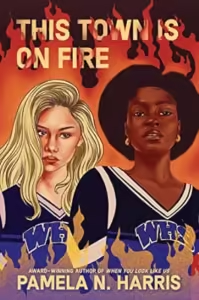This Town is On Fire
Pamela N. Harris
Quill Tree Books
Published June 20, 2023
Amazon | Bookshop | Goodreads
About This Town is On Fire
From the critically acclaimed author of When You Look Like Us comes a page-turning YA contemporary novel about what happens when the latest “Becky” on the internet is your best friend.
A lot is up in the air in Naomi Henry’s her spot as a varsity cheer flier, her classmates’ reaction to the debut of her natural hair, and her crush on the guy who’s always been like a brother to her. With so much uncertainty, she feels lucky to have a best friend like Kylie to keep her grounded. After all, they’re practically sisters—Naomi’s mom took care of Kylie and her twin brother for years. But then a video of Kylie calling the cops on two Black teens in a shopping store parking lot goes viral. Naomi is shaken, and her town is reeling from the publicity.
While Naomi tries to reckon with Kylie, the other Black students in their high school are questioning their friendship, and her former friends are wondering where this new “woke” Naomi came from. Although Naomi wants to stand by her best friend, she now can’t help but see everything in a different light. As tensions in her town escalate, Naomi finds herself engaging in protests that are on the cusp of being illegal. And then a bomb explodes, and someone is found dead. Will Naomi be caught in the center of the blast?
Golden Kite Award winner Pamela N. Harris has crafted a taut novel that delves into big issues, and is the perfect next read for fans of I’m Not Dying with You Tonight and The Black Kids.
My Review
My only gripe with this book at all is that it’s over 400 pages long, which is on the long side for a contemporary YA novel.
That said, the book doesn’t really feel that long. It jumps back and forth between the past (the start of Naomi’s senior year of high school) and the present (immediately after rescue workers pulled her from the wreckage caused by a bomb at a bowling alley). This made the story feel really urgent. You’re piecing together what happened from clues in the scenes reflecting the past.
The characters in the book have a lot of depth and layers to them. Kylie’s ignorance goes viral, sure. And she doesn’t truly seem to understand why people react the way they do. Naomi can’t unsee that ignorance. But does it completely erase all the connection there is between the girls? This is something Naomi has to figure out for herself.
She forms connections with other Black students, and for the first time, she feels truly seen. Those relationships energize her in a new way and make her feel unguarded and free in ways she didn’t expect. But those aren’t simple relationships, either. She experiences betrayal among these new friends, too.
Harris does a phenomenal job of showing the complexities of relationships and reminding us that the people involved are the only ones who get to decide what the relationship means to them. The writing is razor-sharp and raw with honesty. This is a story I won’t soon forget.
Content Notes for This Town is On Fire
Recommended for Ages 14 up.
Representation
List.
Profanity/Crude Language Content
List.
Romance/Sexual Content
List.
Spiritual Content
List.
Violent Content
List.
Drug Content
List.
Note: This post contains affiliate links, which do not cost you anything to use but help support this blog. I received a free copy of this book in exchange for my honest review. All opinions are my own.
